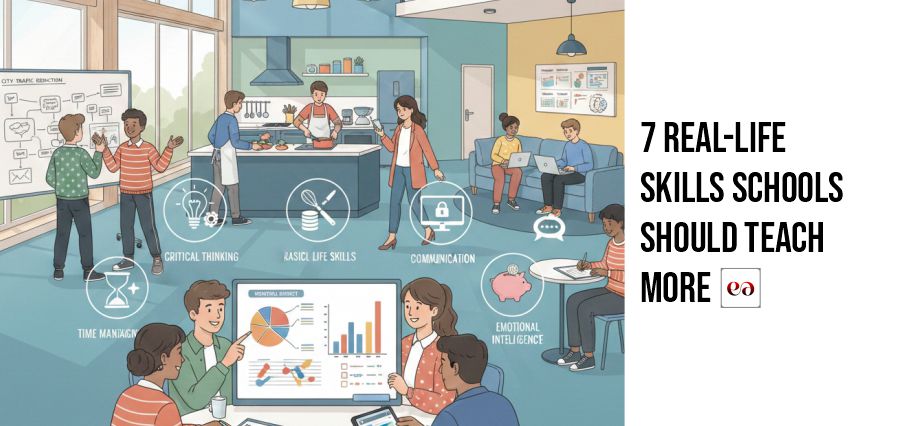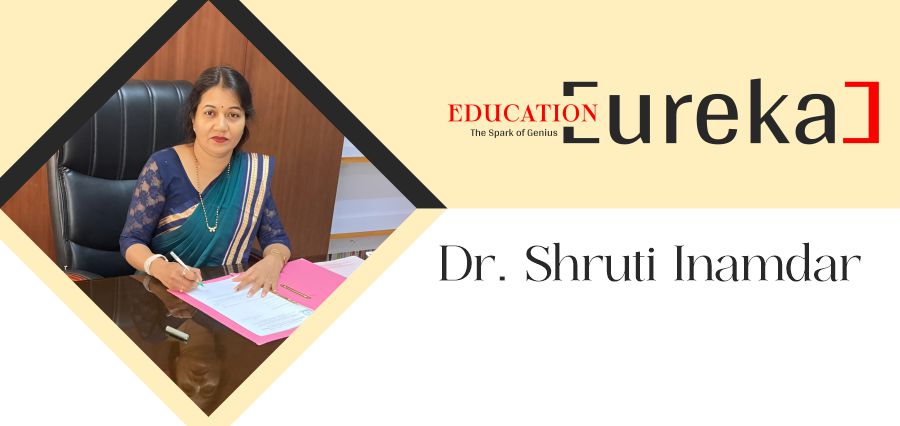
When rural and remote students from Chhattisgarh first enter university, many face a daunting challenge, adapting to a higher education system that feels alien and overwhelming. With limited exposure to job‑oriented learning and few opportunities for hands-on skill development, they risk being left behind. Recognizing this gap, a visionary leader took charge, Prof. Alok Kumar Chakrawal, Vice‑Chancellor of Guru Ghasidas Vishwavidyalaya, to reshape education into an inclusive, empowering journey.
Since assuming the role in July 2021, Prof. Chakrawal has built on his 25+ years of expertise in commerce, finance, and management to transform the institution into a “temple of learning” that mirrors students’ psyches and aspirations. He emphasizes mental‑mapping strategies, teaching not just academic content but also promoting emotional intelligence, empathy, and peer collaboration to mould well‑rounded graduates.
Under the dynamic leadership of Prof. Alok Kumar Chakrawal, Guru Ghasidas Vishwavidyalaya (GGV) has witnessed transformative growth. The university has wholeheartedly implemented NEP 2020, earned NAAC A++ accreditation, and attained Category 1 status under UGC’s Graded Autonomy framework. GGV’s rising global profile is marked by its 263rd QS World University Ranking and 12th position in India (346th globally) in the UI GreenMetric Rankings (2024). Infrastructure has been significantly upgraded, and interdisciplinary research has been revitalized through initiatives like the 3 MV Pelletron Accelerator Project. With nearly 190 patents published and 66 granted, GGV is fast emerging as a hub of academic excellence and innovation.
Prof. Chakrawal extends his influence beyond campus, helping shape policy at the national level. He serves on the Governing Council of the Centre for Narendra Modi Studies and represents Indian universities on the Court and Council of IISc, Bengaluru. These roles have amplified the university’s voice in higher‑education discourse.
Central to his ethos is holistic student development, promoting online education, student entrepreneurship, community outreach, and inclusivity. Prof. Chakrawal has been recognised nationally and internationally with over 30 prestigious awards. These include the Nelson Mandela International Excellence Award 2025 by Asian Council for Education and Research, UK Global Accreditation for Outsanding Contribution to Education, Innovative Education Award by Indonesia, Antarrastriya Prithvi Bhushan Samman, Excellence in Education Award by APAC Global, Life Time Achievement Award by Ramanujan College (University of Delhi), Excellence in Research Collaboration Award by Shinawatra University (Thailand), and the Observer Life Time Achievement Award, by the Observer Peace Foundation, acknowledging his significant contributions to the field of education.
Today, students at Guru Ghasidas Vishwavidyalaya thrive not merely as scholars, but as creative, empathetic problem-solvers ready to tackle global challenges, an enduring testament to Prof. Chakrawal’s transformative leadership.
Prof. Alok Kumar Chakrawal embodies over thirty years of firm dedication to academia, institutional leadership, and educational reform. An academician by training, a researcher by passion, and an institution builder by conviction, his life’s work reflects a deep-seated belief in the transformative power of education. His journey through the world of higher education has been one of intentional purpose and evolving impact, rooted in both personal experience and a philosophical commitment to social upliftment.
Coming from a modest socio-economic background, Prof. Chakrawal has witnessed firsthand how education serves as a gateway not only to professional growth but also to dignity, self-respect, and upward mobility. For him, education is far more than academic instruction; it is a liberating force, a cornerstone of nation-building, and a means to foster social justice. This conviction, deeply personal and unwavering, laid the foundation for his lifelong journey in academia and continues to guide his approach to leadership.
Under his stewardship, the role of the university is seen not just as an institution for disseminating knowledge but as a vibrant ecosystem of inquiry, innovation, and ethical growth. In a region like Chhattisgarh, marked by socio-geographical challenges, he believes that a Central University must act as a transformative force. His leadership at Guru Ghasidas Vishwavidyalaya reflects a mission-driven strategy aimed at bridging educational disparities and championing inclusive growth. He established a nationally replicable model of Institutional Social Responsibility (ISR) by holistically integrating community engagement into its academic and administrative framework. Each initiative under this model embodies the university’s commitment to social equity, sustainability, and inclusive development.
The Swavlambi Chhattisgarh Yojana, launched on 26th September 2022, is a landmark initiative aimed at empowering students and local youth through skill-building, entrepreneurship training, and livelihood generation. This program has catalyzed the creation of student-led startups and community enterprises while facilitating job fairs and workshops that significantly enhanced employability.
On 26th January 2023, the university introduced the GGV Swabhiman Thali, a dignified meal support system ensuring that no student faces hunger due to financial hardship. Initially benefiting 200 students, the initiative has now expanded to serve over 1,000 students daily with subsidized, nutritious meals—contributing to reduced dropout rates and enhanced academic retention among the economically weaker sections.
The GGV-Shravan Line, inaugurated on 14th April 2023, underscores the university’s commitment to elder care. This helpline and volunteer-driven support mechanism connects university students with elderly individuals to offer companionship, assistance, and emotional support, thus fostering intergenerational bonds and enhancing student sensitivity to social responsibilities.
On 4th May 2023, GGV launched the KILKAARI Day Care Centre, providing a safe and nurturing space for the children of university staff and students. It enables working mothers and student parents to pursue academic and professional goals while ensuring their children receive care, engagement, and early learning. The centre also hosts summer camps and skill-building activities for children from surrounding communities.
A significant step towards sustainability and student empowerment was marked by the launch of the GGV Sarathi Yojana on 2nd May 2024. This student-operated electric vehicle transport system promotes eco-friendly mobility within campus while providing students with income-generating opportunities. It also improves accessibility for differently-abled individuals, exemplifying inclusive transportation.
The university’s health-centric vision found expression through the Healthy University Movement (GGV HUM), initiated on 31st January 2024. This movement advocates holistic well-being via preventive healthcare, mental wellness, yoga, and hygiene awareness campaigns, embedding a culture of health consciousness throughout the campus.
In pursuit of educational justice, the GGV Sudama Yojana was launched on 15th August 2024 to support students from marginalised and financially disadvantaged backgrounds. Through academic mentoring and financial assistance, the scheme has already benefited close to 100 students, reinforcing GGV’s mission of equitable access to higher education.
On 18th December 2024, the university institutionalized its commitment to health and humanitarian values through the GGV Rakta-Sambandh Sanskaar Yojana. This initiative builds a network of voluntary blood donors among students and staff, ensuring regular donation drives, emergency support systems, and public health awareness.
Promoting a culture of academic volunteerism, GGV has launched the GGV Shiksha Mitra Yojana, which aims to mobilize university students to serve as peer educators for underprivileged schoolchildren in nearby communities. By facilitating morning and evening learning sessions, this initiative will not only enhance grassroots educational outcomes but also cultivate leadership, pedagogical skills, and empathy among student volunteers, aligning closely with the vision of NEP 2020.
Prof. Chakrawal has led the university in taking bold, proactive steps to implement the policy’s principles, turning it into more than a document, into a lived experience for students. His approach emphasizes not just academic credentials, but a sense of direction, moral purpose, and social accountability. Together, these initiatives reflect GGV’s progressive vision of higher education as a tool for societal transformation. Its integrated ISR framework exemplifies how universities can serve as epicentres of inclusive growth, civic responsibility, and sustainable development
What drives him each day is the hope and fire he sees in the students, their resilience, their dreams, and their belief in the power of education to change their lives. Prof. Chakrawal sees his role as one of lighting that spark and nurturing it into a sustained flame. His vision is to cultivate institutions that are not only intellectually rigorous but also emotionally intelligent, ethically sound, and socially aware. Through his efforts, Guru Ghasidas Vishwavidyalaya stands not only as a beacon of academic excellence but also as a sanctuary for character building and social change.
Prof. Chakrawal’s transition from academia to university administration has been marked by continuous learning, deep reflection, and a commitment to purposeful leadership. While his roots as a teacher and researcher laid the foundation for his respect toward academic rigor and intellectual integrity, his roles in administration, particularly his journey from Saurashtra University to serving as the Vice Chancellor of Guru Ghasidas Vishwavidyalaya, reshaped his perspective of education as an interconnected ecosystem.
His engagement with students and faculty from tribal and underrepresented communities served as a turning point, instilling in him the importance of responsive and inclusive leadership. Leading the implementation of the National Education Policy (NEP) 2020 at his university provided another formative experience. Guiding the institution through a transition to a multidisciplinary framework further deepened his belief in participatory leadership and policy innovation.
For Prof. Chakrawal leadership is not about authority, it is about empathy, equity, and excellence. He sees himself as a facilitator who builds trust, nurtures collaboration, and turns challenges into opportunities for growth and transformation.
With over two decades of mentoring Ph.D. and M.Phil. scholars, Prof. Chakrawal has cultivated a research culture grounded in critical inquiry and ethical responsibility. He encourages his mentees to challenge prevailing paradigms, engage with original sources, and adopt interdisciplinary methods that are contextually relevant. In today’s digital age of abundant information, he emphasizes the need for discernment, the capacity to distinguish between raw data and meaningful knowledge.
Regular discussions on academic integrity, including issues like plagiarism and intellectual honesty, are a staple in his mentorship approach. His focus remains on creating an environment where original thought is not only welcomed but expected—an environment where curiosity thrives and students grow into scholars who are both intellectually independent and socially responsible.
As Vice Chancellor Prof. Chakrawal faced unique challenges involving socio-cultural integration, institutional accountability, and academic morale. Understanding the diverse backgrounds of the university’s stakeholders, he championed a leadership approach that valued inclusivity and emotional intelligence.
Through transparent governance, decentralized decision-making, and trust-based collaboration, he led initiatives that reshaped the institutional culture. Social outreach programs, community partnerships, and wellness-focused policies helped foster a nurturing and equitable academic environment. By aligning empathy with efficiency, he created a space where voices are heard, contributions recognized, and excellence driven by a collective sense of purpose.
Prof. Chakrawal’s international experiences, ranging from his executive leadership program at Oxford University to academic visits in the USA and UK, have significantly influenced his educational philosophy. These experiences offered a global lens into how autonomy, strategic research funding, and student-centric policies can create resilient educational ecosystems.
He observed institutions that prioritized not only academic standards but also student well-being, environmental sustainability, and community engagement. Inspired by these global practices, he has infused his leadership at Guru Ghasidas Vishwavidyalaya with a renewed vision, one that balances innovation with responsibility, and national goals with global standards. His aim is to shape the university into a hub of academic excellence and meaningful social transformation.
Prof. Chakrawal, serving on the Court and Council of IISc, brings with him a perspective deeply informed by his leadership of a central university in India’s Western region, an area marked by tribal diversity and developmental challenges. His on-ground experience has shaped a belief that region-specific, inclusive scientific research can be a catalyst for social transformation.
He advocates for bridging advanced research with local innovation ecosystems to tackle pressing issues such as sustainable resource management and rural development. His vision includes fostering stronger collaborations between premier institutions like IISc and those in underserved regions to drive equitable, technology-led national progress rooted in cutting-edge research and self-reliance.
With a background that spans both academia and corporate administration, Prof. Chakrawal has effectively merged strategic corporate management principles into the academic realm. His governance style includes the use of strategic planning, performance tracking, and transparent accountability measures.
By promoting a data-driven, results-oriented culture, he enhances institutional performance while upholding academic integrity. His leadership at Guru Ghasidas Vishwavidyalaya reflects a seamless integration of innovation, teamwork, and administrative efficiency, creating agile institutions that adapt to the rapidly evolving higher education environment, ultimately delivering sustainable outcomes and stakeholder satisfaction.
Armed with an academic background in commerce, finance, and management, Prof. Chakrawal envisions business education in India transitioning toward a multidisciplinary, research-driven future. His approach encourages a synthesis of economic analysis, strategic thinking, and ethical leadership.
As Vice Chancellor, he promotes curricula that embed technological advancements, sustainability principles, and global business values. His emphasis on experiential learning and industry partnerships aims to equip students with critical thinking, adaptability, and an entrepreneurial spirit, fostering the next generation of socially responsible business leaders attuned to the complexities of a fast-evolving economy.
The implementation of the National Education Policy 2020 has opened up significant opportunities for central universities, especially in curricular reform, interdisciplinary learning, and research enhancement. Prof. Chakrawal recognizes that while the policy fosters academic flexibility and student-centric approaches, it also presents challenges such as infrastructure demands and faculty development.
At Guru Ghasidas Vishwavidyalaya, under his leadership, the institution has proactively adopted NEP 2020 by redesigning programs, introducing interdisciplinary courses, and upgrading digital infrastructure. A strong emphasis is placed on inclusive teaching practices and faculty upskilling, aligning the university with the vision of creating a progressive and future-ready academic ecosystem.
Prof. Chakrawal’s decorated academic journey, marked by multiple gold medals and best paper awards, is underpinned by discipline, intellectual curiosity, and a commitment to lifelong learning. His success stems from setting clear personal goals, meticulous time management, and embracing challenges as stepping stones. At the institutional level, he leads by example, fostering a culture of integrity, innovation, and resilience.
Through mentorship and collaborative engagement, he motivates students and faculty alike to pursue excellence with purpose and passion. His leadership style encourages a growth mindset, instilling in the academic community a shared drive to push boundaries and reach their highest potential.
In his role with the Internal Quality Assurance Cell (IQAC), Prof. Alok Kumar Chakrawal has adopted a proactive and inclusive approach to embed continuous improvement and accountability within institutional systems. His strategy centers on transparency, engagement, and evidence-based decision-making. By consistently gathering feedback from students, faculty, and industry stakeholders, he ensures that institutional practices remain responsive and relevant.
Chakrawal has also emphasized the importance of capacity-building, regularly organizing workshops and training sessions to encourage faculty and staff to adopt best practices in pedagogy, research, and administration. The introduction of clear benchmarks and robust monitoring mechanisms has led to measurable progress across departments. His collaborative ethos fosters ownership and drives innovation, thereby enhancing academic quality, research productivity, and administrative performance. For him, quality is not a one-time achievement, but a continuous, institution-wide commitment.
As a leader, Prof. Chakrawal demonstrates that administrative responsibilities and academic passions are not mutually exclusive. He believes that deliberate time management and strategic delegation are key to maintaining this balance. By cultivating empowered teams, he is able to focus on big-picture governance while still engaging in research and academic development.
He integrates his research orientation into leadership by nurturing a culture of inquiry and innovation throughout the institution. Regular mentoring and participation in academic forums allow him to remain closely connected to student perspectives and evolving educational needs. Prof. Chakrawal leverages digital platforms and flexible schedules to remain agile in a rapidly changing academic environment. His holistic approach ensures that both institutional strategy and individual academic growth are nurtured simultaneously.
Prof. Chakrawal envisions Indian universities rising as global hubs of knowledge that honor traditional wisdom while pushing the frontiers of modern research and innovation. He advocates for strong interdisciplinary collaboration, global academic partnerships, and sustained investment in faculty development and infrastructure to realize this vision.
According to him, embracing digital transformation and fostering entrepreneurial mindsets will greatly enhance the relevance and global competitiveness of Indian institutions. He aligns this vision with the goals of the National Education Policy 2020, emphasizing the need for curricula that balance global expectations with local relevance. Prof. Chakrawal believes that promoting ethical leadership, inclusivity, and academic freedom will position Indian universities as leaders in global knowledge creation and sustainable development.
He often states, “Greatness in education is not a gift but a journey, built on vision, fuelled by persistence, and defined by fearless innovation.” This philosophy underpins his mission to elevate Indian higher education on the world stage.
Explore more insightful articles, interviews, educational news, and educational magazines on our website. Click here to stay informed and inspired!






Welcome to the future of digital storytelling, where creativity meets innovation. We’re not just a magazine platform; we’re a team of passionate visionaries committed to transforming how stories are shared, celebrated, and experienced in the digital age. Join us as we inspire, inform, and redefine the world of digital magazines.
© Copyright 2025 | educationeureka | All Rights Reserved.